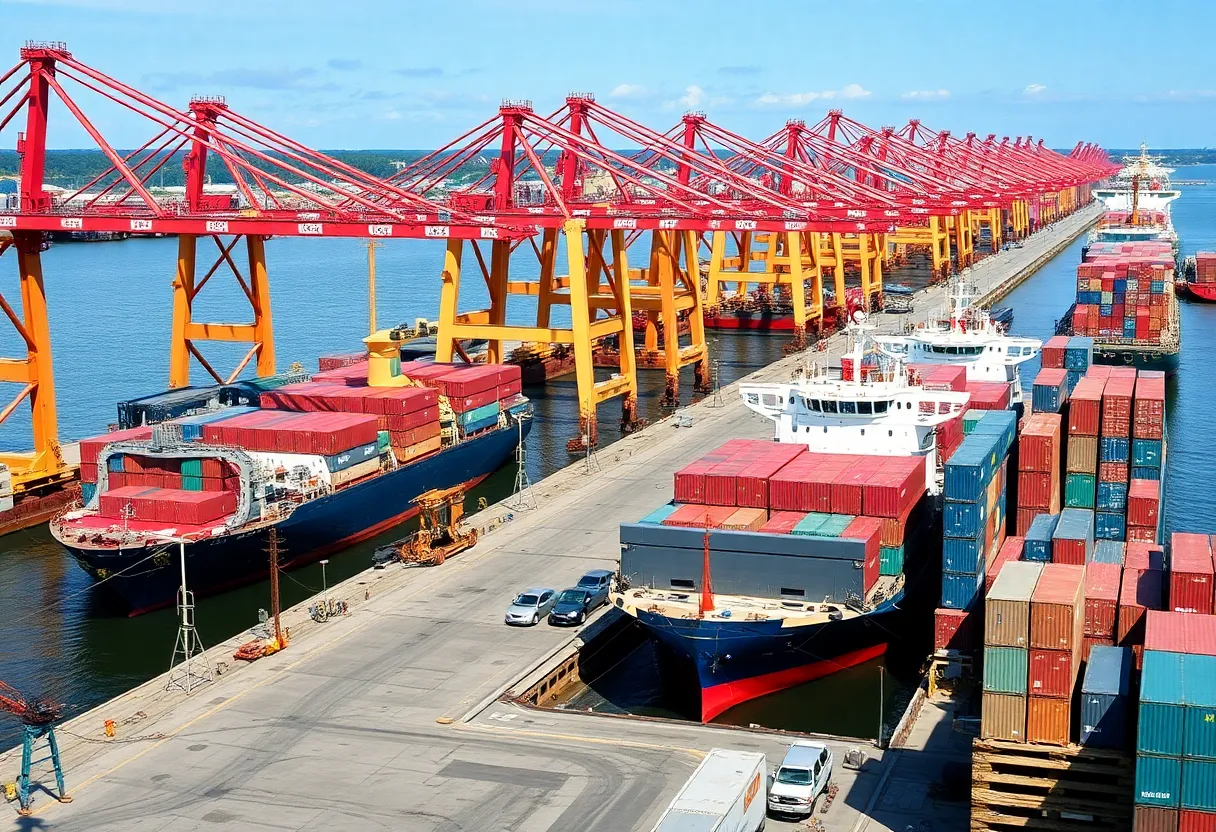News Summary
A new study reveals that South Carolina’s private marine terminals contribute nearly $6.5 billion to the state’s economy, highlighting their critical role in job creation and tax revenue. The research underscores the potential for continued growth in the logistics and manufacturing sectors, with salaries in the terminals significantly above the state average. As South Carolina navigates economic challenges, the maritime industry shows promise for future resilience and opportunities.
South Carolina’s private marine terminals contribute nearly $6.5 billion to the state’s economy, according to a recent study presented at the Maritime Association of South Carolina’s Logistics Summit. This substantial financial input underscores the terminals’ importance in bolstering the local economy and job market.
The study, conducted by Joey Von Nessen, a research economist at the University of South Carolina, involved a comprehensive survey of all 19 private marine terminals operating within the state. The findings reveal that approximately $4 billion stems from direct operations, with an additional $2.6 billion generated through multiplier effects. These figures highlight the critical role of private marine terminals in sustaining and growing South Carolina’s economy.
Alongside their significant economic contributions, the private marine terminals also provide an estimated $99 million in tax revenue for the state. The maritime industry facilitates the creation of various job opportunities across industries such as manufacturing, health care, and retail. Notably, for every 10 jobs produced directly through terminal operations, there are an additional 25 jobs created in different sectors throughout South Carolina.
Furthermore, the average salary for positions within these private marine terminals stands at $77,346, which is considerably higher than the state’s overall average salary of $57,932. This pay difference of 33% indicates that jobs within the marine terminals not only contribute significantly to economic output but also offer attractive employment opportunities for local residents.
Despite these positives, South Carolina is grappling with an unemployment rate hovering around 6%. This rate is affected by a growing population paired with slower job growth across various sectors. However, data from Von Nessen indicates that South Carolina’s economy is rated a B+ due to an increase in import and export activities, signaling recovery since their decline in 2023.
In recent months, a noticeable trend away from the pandemic bubble has emerged, highlighting a shift towards more sustainable growth rates within the state economy. With inflation rates dropping below average wage growth, consumers are beginning to regain the purchasing power they lost during a period of high inflation, further supporting economic stability.
The findings from this study highlight the reliance of South Carolina’s economy on its logistics and manufacturing sectors. The data not only portrays the private marine terminals as vital economic engines but also provides deeper insights into the broader economic impacts of maritime activities in the region.
This new research reinforces the critical role played by South Carolina’s marine terminals in shaping the state’s economic landscape. As the demand for maritime services continues to grow, it will be essential to monitor how these terminals evolve and how they can further contribute to economic resilience and job creation in the future.
Deeper Dive: News & Info About This Topic
- Charleston Business: Study on Private Maritime Terminals
- Marine Log: SC Ports Completes Wando Welch Terminal Upgrades
- WorkBoat: Orion to Build New Wharf in Port of Charleston
- Supply Chain Dive: ILA Ports Strike Impact on Cargo Operations
- Charleston Business: SC Ports Shuts Down Maritime Terminals
- Wikipedia: Maritime Industry
- Google Search: South Carolina maritime economy
- Google Scholar: South Carolina marine terminals
- Encyclopedia Britannica: Maritime Industry
- Google News: South Carolina marine terminals

Author: STAFF HERE FLORENCE WRITER
The FLORENCE STAFF WRITER represents the experienced team at HEREFlorence.com, your go-to source for actionable local news and information in Florence, Florence County, and beyond. Specializing in "news you can use," we cover essential topics like product reviews for personal and business needs, local business directories, politics, real estate trends, neighborhood insights, and state news affecting the area—with deep expertise drawn from years of dedicated reporting and strong community input, including local press releases and business updates. We deliver top reporting on high-value events such as the Florence Festival of Lights, Pee Dee Pride, and agricultural expos at the Florence Center. Our coverage extends to key organizations like the Florence Regional Chamber of Commerce and the Pee Dee Area Council of Governments, plus leading businesses in healthcare and retail that power the local economy such as McLeod Health and Pee Dee Electric Cooperative. As part of the broader HERE network, including HERECharleston.com, HEREColumbia.com, HEREGreenville.com, and HEREHiltonHead.com, we provide comprehensive, credible insights into South Carolina's dynamic landscape.





